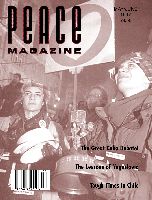
Peace Magazine May-June 1997, page 31. Some rights reserved.
Search for other articles by Metta Spencer here
Andres Oppenheimer New York And Toronto: Simon And Shuster, 1993, 475 Pages.
As its title suggests, this book was published in 1993 during a period of Fidel Castro's rule when many Cubans were expecting his regime to disintegrate. Such a prophecy has not come true, and indeed Cuba's economy has recovered considerably, reducing the prospect of revolt. We review this four-year-old book only because it is the best counterpart to the book reviewed on the preceding page, which recounted CIA plots against Castro. Oppenheimer, a Pulitzer Prize-winner, exposes the darkness of Cuban society.
His story begins in 1989 at the execution by firing squad of four Cuban officials, including the popular and highly-decorated General Arnaldo Ochoa Sanchez, who had been a close friend of Castro. The four condemned men had been convicted of smuggling cocaine, though they claimed to have done so with Castro's tacit permission. Ochoa had spent the money assisting impoverished veterans who had served under him in Angola. Whether or not Castro had approved the trafficking (proof is lacking), Oppenheimer claims that the executions shocked Cuban society and for the first time undermined the public's faith in "the Comandante." Graffiti artists began scrawling "8A" on Havana walls, referring to their hero "Ocho A." The executions were seen as a threat to crack down on anyone promoting perestroika in Cuba.
If the Ochoa case was a domestic "crack in the system," Castro also faced foreign problems in dealing with Panama's Noriega and Nicaragua's Ortega. He refused Noriega's request for surface-to-air missiles but gave without charge 80,000 conventional weapons and rockets, in addition to training Panamanian officers in sabotage operations and helping to set up an intelligence agency in Panama. Both men hoped that a nationalist war in Panama would spread and become a regional Central American war. No such luck. The U.S. invasion of Panama in December 1989 met little resistance. Only a few weeks later, Castro's fan Daniel Ortega ignored his mentor's advice and held a free election in Nicaragua. His regime was defeated.
In early 1990 other allies deserted Castro. The Berlin wall had fallen and the new regimes in Czechoslovakia and Poland actually cosponsored a resolution in the U.N. Human Rights Commission to investigate human rights abuses in Cuba.
The Soviet Union had supplied more than 90 per cent of Cuba's oil and provided $3 billion a year in subsidies. About 40 per cent of Cuba's food came from Soviet bloc countries. Now Gorbachev told Cubans to negotiate trades with the newly autonomous Soviet firms. Oil supplies dropped by 25 per cent instantly; Castro told Cubans to ride bikes and plow fields with oxen.
It was lack of soap that upset people most. Thousands put to sea on inner tubes; only two out of three made it alive. The rafters were mostly white and middle class. The shortages had worn them down, but many reported that "ideological fatigue" also had been a major factor in their decision to flee.
Oppenheimer met children and grandchildren of Castro and Che Guevara, the revolution's icon. Hilda, 35, the oldest of Che's five children, was a librarian who no longer hid her disillusionment with the regime. Her long-haired son Canek, 17, who intended to be a rock musician, was even more critical, expressing a desire to live in a country where initiative is rewarded. Pablo, 26, a nephew of Che's, still supported the revolution but was bored with politics and refused to do voluntary farm work. Oppenheimer also interviewed Alina, 35, Castro's only known daughter, who described him as a "tyrant" who did not listen to others. He had not let her emigrate, she complained. "What bothers me most is the disinformation," she said."The lack of news, literature. We don't know what is being published abroad. ... I'm typical of my generation. ... We feel frustrated, useless."
Was Alina really typical of her generation? Oppenheimer visited a Havana pollster and asked to see their surveys. When asked in 1989, "Who is the most important political personality of the world today?" 89 per cent had named Fidel. When asked whether Cuba's problems should continue to be solved through a one-party system, 95 per cent had said yes. Oppenheimer claims that the polls were biased. Were they? What do Cubans really want? No one can be sure until there is a free election.
Reviewed by Metta Spencer

Peace Magazine May-June 1997, page 31. Some rights reserved.
Search for other articles by Metta Spencer here